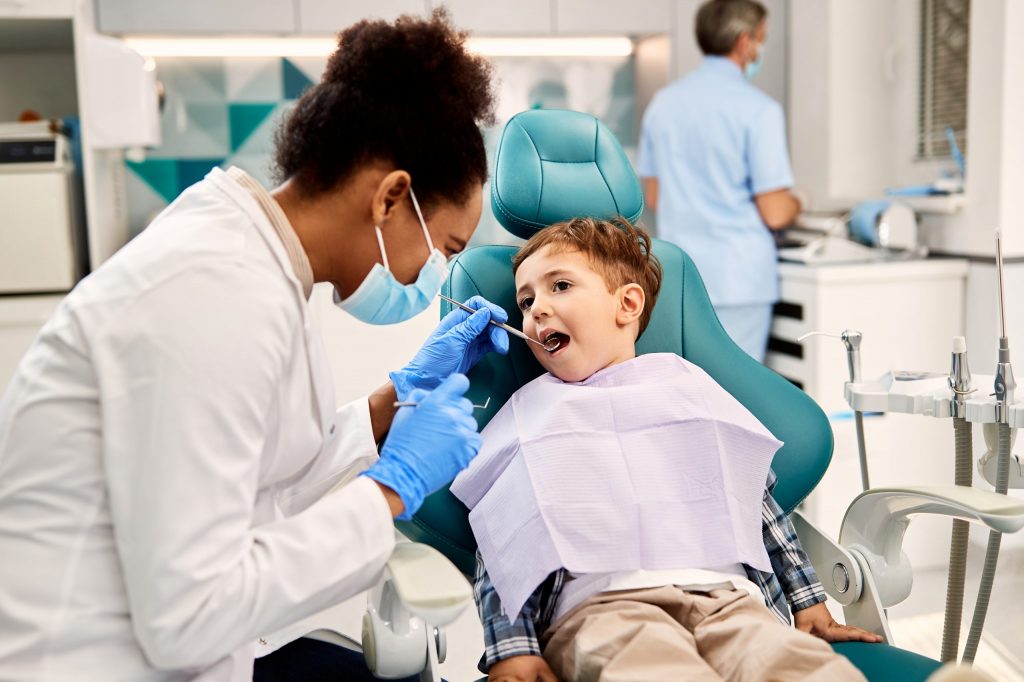Resource Library
Start Reading

What good habits do you want to instill in the children you care about? Saying “please” and “thank you”? Making their beds and cleaning their rooms? Getting plenty of physical activity? Reading more and watching screens less?
All these habits are important. So are good children’s oral health habits.
Oral health is integral to any child’s overall health. Unfortunately, oral health among children in the United States is often poor.
 For example, children’s cavities are the nation’s most common chronic childhood disease. As many as 10% of 2 to 5-year-olds have untreated cavities. More than half of 6 to 8-year-olds have at least one in their baby (primary) teeth. And more than half of adolescents have at least one in their permanent teeth.
For example, children’s cavities are the nation’s most common chronic childhood disease. As many as 10% of 2 to 5-year-olds have untreated cavities. More than half of 6 to 8-year-olds have at least one in their baby (primary) teeth. And more than half of adolescents have at least one in their permanent teeth.
Cavities, gum disease, and other oral health problems can cause children discomfort, pain, and tooth loss. Poor oral health can also hurt children’s performance at school. It can make them want to avoid social situations, as well. And research shows connections between poor oral health and increased risk of other health issues later in life such as heart disease, diabetes, and even dementia.
Children don’t always understand why dental care and oral hygiene matter. Helping them form habits that promote good oral health is one of the most important gifts you can give them.
Here at Penn Dental Family Practice (PDFP), parents and other caregivers often ask how to help children get and stay in good oral health. Read on for seven answers we most often give.
 7 Child Dental Care Tips Proven To Promote Good Oral Health
7 Child Dental Care Tips Proven To Promote Good Oral HealthThe benefits of good children’s oral health are many and meaningful. Healthy teeth and gums let children chew and speak properly. They contribute to a bright and attractive smile, which in turn contributes to positive social interactions and high self-esteem. But to enjoy these benefits, children need your help.
Here are seven important things you can do.
It’s never too soon to start teaching children about oral health. The best time is when they are babies. Even before their baby teeth start to come in (between six and twelve months), you can clean their gums with a soft, damp cloth after each feeding.
You set an example for your children in many areas of life. Make sure oral hygiene is one of them. If you want your child to regularly brush and floss their teeth, let them see you doing the same.
Children (like most grown-ups) are more likely to stick with an activity if they enjoy it. Let them choose toothbrushes shaped like cartoon characters. Use fluoridated toothpaste in fun flavors. Sing songs as you brush and floss together. Turn daily dental hygiene into a game—for instance, track brushing and flossing with stickers on a chart, which they can redeem for small rewards.
Serve your children as many healthy foods and drinks as you can. Keep sugary snacks and drinks, including juices, as occasional treats. Encourage your child to drink plain tap water throughout the day, as water helps wash away food particles and debris. The less sugar they consume, the fewer cavities children are likely to have, let alone other, more serious oral health problems.
 5. Praise Children for Practicing Good Oral Hygiene
5. Praise Children for Practicing Good Oral HygieneWhen your child brushes and flosses, be sure to praise them. Encourage them as they learn the proper techniques. Cheer them on when they’ve mastered them. Your positive feedback will help children feel good about caring for their teeth, making them more likely to keep doing it.
Developing good children’s oral health habits takes time. Be patient. Don’t get discouraged if your children don’t get the hang of correct brushing and flossing right away. Take time for repeated demonstrations, gently guide their hands as needed, and give calm, gentle reminders.
Taking your children to the dentist for regular checkups and cleanings is crucial to their oral health. Dental professionals will clean your child’s teeth and catch problems early on to help prevent them from getting worse. They’ll also answer any questions or concerns you have about your child’s oral hygiene routine.
Our skilled pediatric dentists at PDFP can help your child’s teeth and mouth become and stay as healthy as possible. Their training and experience in treating children, including those with disorders and disabilities, help put your child on the path to a lifetime of bright and healthy smiles.
For more information about how our Philadelphia pediatric dentists can improve your children’s oral health, download our free pediatric dentistry fact sheet now.
You can also schedule an appointment online or call us at 215-898-PDFP (7337).